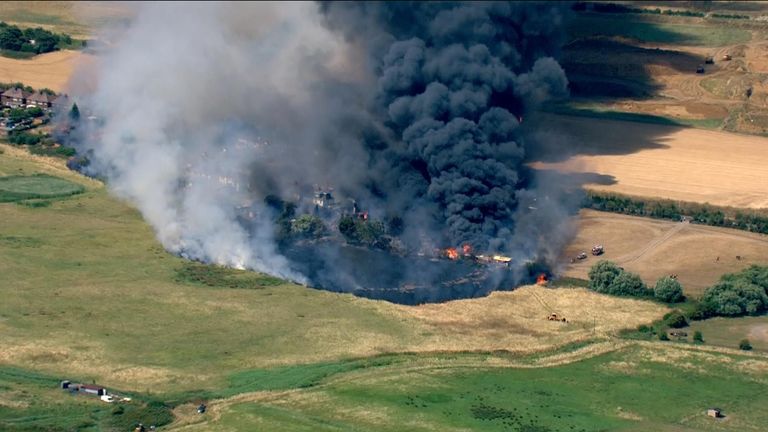More than 61,000 people died in Europe last summer as a result of extreme heat, a study has found.
The research by scientists at the Barcelona Institute For Global Health and the French National Institute For Health showed that Italy suffered the highest numbers of heat-attributable deaths at 18,010.
Italy was followed by Spain, with 11,324 deaths, and Germany, with 8,173.
The study, published in Nature Medicine, focused on the period between 20 May and 4 September 2022 and found that 3,469 people died in the UK.
Please use Chrome browser for a more accessible video player
5:26
Is your euro holiday in drought area?
The summer of 2022 was Europe’s hottest on record and was marked by drought, wildfire, and periods of extreme heat.
The most intense period was between mid-July and mid-August, during which the researchers said 38,881 people died across the continent.
Heat-attributable mortality was much higher among older people, particularly in women.
Europe’s highest summer death toll from heat was in 2003, when over 70,000 excess deaths were recorded.
Study author, Joan Ballester Claramunt, said: “The summer of 2003 was an exceptionally rare phenomenon, even when taking into account the anthropogenic warming observed until then.
“This exceptional nature highlighted the lack of prevention plans and the fragility of health systems to cope with climate-related emergencies, something that was to some extent addressed in subsequent years.
“In contrast, the temperatures recorded in the summer of 2022 cannot be considered exceptional, in the sense that they could have been predicted by following the temperature series of previous years, and that they show that warming has accelerated over the last decade.”
Please use Chrome browser for a more accessible video player

2:12
England ‘not ready’ to respond to extreme heatwaves
Read more:
UK heatwave was made 10 times more likely by climate change – study
Weather phenomenon El Nino set to further drive up hot temperatures
Europe has a water problem – more groundwater is being lost than replaced
Researcher Hicham Achebak said: “The fact that more than 61,600 people in Europe died of heat stress in the summer of 2022, even though, unlike in 2003, many countries already had active prevention plans in place, suggests that the adaptation strategies currently available may still be insufficient.
“The acceleration of warming observed over the last 10 years underlines the urgent need to reassess and substantially strengthen prevention plans, paying particular attention to the differences between European countries and regions, as well as the age and gender gaps, which currently mark the differences in vulnerability to heat.”
Across Europe, cold temperatures cause many more deaths than heat, although increasingly mild winters are contributing to a reduction in that mortality rate.
However, the Office For National Statistics said: “Globally, human-induced climate change has been estimated to account for 37% of heat-related deaths (1% in the UK).
“Initial reductions in deaths because of milder winters have been predicted to be outweighed by increases in heat-related mortality.
Please use Chrome browser for a more accessible video player

0:58
UK’s hottest June on record leads to death of hundreds of fish in rivers
“Estimates suggest 257% extra heat-related deaths and a 2% decline in cold-related deaths by the 2050s.
“Our preliminary findings are similar, although we have found greater decreasing cold-related mortality.
“Cold-related health impacts have declined over the last century.
“There is evidence that factors other than climate change may have driven reductions in cold-related mortality.
“Some evidence suggests that improvements in socioeconomic circumstances, health infrastructure and behavioural adaption have reduced vulnerability to cold, however, the attribution of causality remains complex.”







